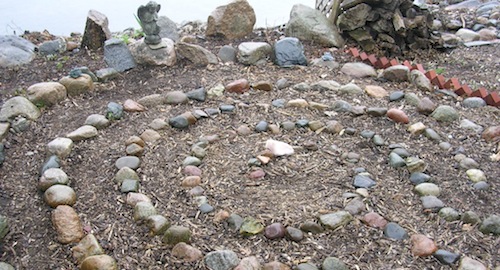Three-Part Harmony
Ross Gale, a writer and creative consultant, just started his second online creativity series, "With Flames Upon Their Heads." He invited a group of writers to respond to the questions: What is the role of the creator? How does being a creator inform our work? Do you see yourself as co-creator? Re-creator? Gale describes the series as a "conversation, a meditation, and an inspiration."
My post went up last Monday, “Three-Part Harmony.” It’s a mini-essay and shows my thoughts about writing as creating, discovering creation, and participating in creation. I hope you’ll check out my post and all the others that are being posted daily for a couple weeks. Keep Ross’s blog bookmarked as you're sure to see lots of good things developing there in the future.
The first series, "Bereshit Bara," ran last summer with posts from 13 writers addressing the question of what triggers the first creative impulse. If you missed it, it's not too late to hear from Shannon Huffman Polson, David Clark, Adele Konyndk and others.
Reading Stack: The Prairie in Her Eyes
This book, with a cover the colors of autumn, caught my eye on a library table and I added it to my stack. Published by Milkweed Books (2001), The Prairie in Her Eyes by Ann Daum is part of its now gone “The World As Home” nonfiction series, which had been “dedicated to exploring our relationship to the natural world.”
Explore is what essays do best. Essays don’t teach. Although the reader of any essay, if it’s a good essay and if she’s a good reader, usually comes to the last sentence knowing more about the world and humankind than when she started. Essays don’t preach. Although the reader may certainly turn the last page only then to turn his life, or his thoughts or heart, in a new direction. Essays don’t give steps one through five for accomplishing anything, although they may sneak in tips, and certainly a reader may indeed accomplish something a result of reading an essay that he or she had never before considered.
I liked this collection of essays, and I like that Milkweed allows their nonfiction book chapters to be called essays if that is what they are. “Essay” is nearly a four-letter word these days in the publishing industry (yes, I know, essay is five letters). "They don’t sell; they’re too hard for the average reader; they aren’t immediately useful to the reader." Call the essay a chapter instead and hope the rose still smells as sweet. But I digress.
Daum’s essays are about growing up and living as an adult on a ranch in South Dakota. They are grounded in the world, in life, thingness, yet are about something bigger and universal, another mark of a good essay. Read them and you’ll be thinking about loss and grief, about courage, about returning to where you’re from but have never been as if coming home, about fear of death, nature’s beauty and cruelty, abundance and desperation. (Warning: there’s also gross chicken ranch stuff, which will make you only want to eat free-ranch chickens, if that.)
Daum’s tone is steady and calm, delivering no big epiphanies but lots of quiet ones, the best kind. One essay after another, Daum trusts the reader to take them as an offering, not to make them more or less than what they are--not a guide for living but a witness, a testimony.
Once the grass is up, all these mares will go to pasture, and then my evenings spread to include walking over prairie to inspect udders for any signs of milk or waxing. I love walking out to check the mares. In a wet year the prairie will be alive with frogs and locusts, nighthawks and meadowlarks. The grass stretches as far as I can see; farther. The mares move across the hills, even with their pregnant bellies, with the grace of wild things.
More On The “Essay”
If you’re interested in the essay as either a reader or a writer, you’ll want to know about Patrick Madden, a professor at Brigham Young University. He’s written a lovely book of essays called Quotidiana (University of Nebraska) and has a website by the same name, dedicated to the cultivation of the classic essay. I've heard him speak a couple times, the latest being at the Festival of Faith and Writing at Calvin College last year. He’s very entertaining and full of knowledge about the history of the essay and its place in our current literary culture.
To add my support to the cause of the essay I may be more intentional about posting mini-reviews about essays and essay collections here in this space.
Final Word
This quote came at me from multiple directions this week. Because it fits the essay theme of the entries above, and because I always long for the sea, particularly a warm sea since it is now mid-winter, and have other land-locked friends that do as well, I'll share it here. It's attributed to Antoine de Saint Exupéry, author of the classic The Little Prince, as well as a wonderful memoir-in-essays, Wind, Sand and Stars.
"If you want to build a ship, don't drum up people to collect wood and don't assign them tasks and work, but rather teach them to long for the endless immensity of the sea."
~~~
I hope you can do some exploring this weekend, on paper or out in the world.
[Note: the photo is an extreme close-up of brush strokes from a painting of the sea by Vasili Nechitailo. Gorgeous, isn't it? I don't think there was a "no photography" sign up when I took it.]






